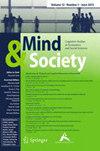职业人士情绪智力与幸福感的研究
Q1 Arts and Humanities
引用次数: 0
摘要
职场人士的社交和心理能力对组织的顺利运作至关重要。如今,情商(EI)已经成为心理健康、快乐和幸福的代名词。考虑到情商的重要性,本研究考察了在私营和政府部门银行担任管理人员的专业人员的情商和幸福感的模式。研究还调查了专业等级和工作任期是否对上述变量产生显著差异。研究结果表明,不同行业、不同干部、不同任期的专业人员的认知存在显著差异。同样,相关分析结果表明,福祉(WB)的所有基本组成部分都与EI有着深刻的、根本的和决定性的联系(p.01)。可以肯定的是,情绪会影响个人的思考和行为,影响判断和信息处理。高情商的员工更容易发现合适的安排,更能合理地工作和运用情感资源,在与个体的通信和合作中往往能迅速获得社会帮助,从而减少失望的机会和失望导致的去人格化。本文章由计算机程序翻译,如有差异,请以英文原文为准。
Study of Emotional Intelligence and Well-Being among Working Professionals
Working professionals’ social and mental capacities are critical to the smooth operation of
organizations. Emotional intelligence (EI) nowadays has become synonymous with mental health,
happiness, and well-being. Looking at the importance of emotional intelligence, the present study
examined the pattern of emotional intelligence and wellbeing with its dimensions of professionals working
as managers in private and government sector banks. It was also investigated whether professional
hierarchy and work tenure produced any significant differences for the aforementioned variables. The
results of the study indicated that professionals working in different sectors, in different cadres, and in
different work tenures indicated significant differences in their perceptions. Similarly, co-relational
analysis results demonstrated that all essential components of well-being (WB) are profoundly,
fundamentally, and decisively linked (p.01) with EI. To be sure, emotion influences how individuals
think and act and influences judgement and information processing. Employees with higher EI can
discover appropriate arrangements all the more easily, work and apply emotional resources sensibly
and can frequently rapidly get social help in correspondence and cooperation with individuals, thereby
lessening the chance of disappointment and the depersonalization achieved by disappointment.
求助全文
通过发布文献求助,成功后即可免费获取论文全文。
去求助
来源期刊

Mind and Society
Arts and Humanities-Philosophy
CiteScore
2.30
自引率
0.00%
发文量
5
期刊介绍:
Mind & Society is a journal for ideas, explorations, investigations and discussions on the interaction between the human mind and the societal environments. Scholars from all fields of inquiry who entertain and examine various aspects of these interactions are warmly invited to submit their work. The journal welcomes case studies, theoretical analysis and modeling, data analysis and reports (quantitative and qualitative) that can offer insight into existing frameworks or offer views and reason for the promise of new directions for the study of interaction between the mind and the society. The potential contributors are particularly encouraged to carefully consider the impact of their work on societal functions in private and public sectors, and to dedicate part of their discussion to an explicit clarification of such, existing or potential, implications.Officially cited as: Mind Soc
 求助内容:
求助内容: 应助结果提醒方式:
应助结果提醒方式:


